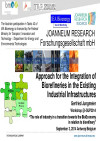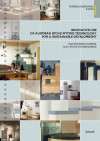Suchergebnisse
Establishing a logistics concept for an efficient collection of biogenous waste as input for energy recovery in biogas plants.
The basic organizational and technical conditions along with possible obstacles and critical success factors are investigated.
Participation in TASK 25 of the Implementing Agreements on Solar Heating and Cooling of the International Energy Agency (IEA)

Participation in TASK 25 "Solar Assited Air Conditioning of Buildings". Description and Analys of the state of the art, development of a simulation tool, build up and measurement of demonstration plants.
Correlation of the loss in photovoltaic module performance with the ageing behaviour of the backsheets used (2015)

Die Leistung von Photovoltaikmodulen mit unterschiedlichen Rückseitenfolien vor und nach beschleunigten Alterungstests wurde untersucht. Neben den elektrischen Parametern wurden die Photovoltaikzellen auch mittels Elektrolumineszenz analysiert. Alterungsbedingte Änderungen in den polymeren Materialien wurden durch Thermo-analytische Methoden und Raman- und Infrarotspektroskopie analysiert.
Voronko, Y., Eder, G.C., Knausz, M., et al.
Herausgeber: Copyright © 2015 John Wiley & Sons, Ltd.
Englisch, 15 Seiten
PSS-ÖB - Strategies to deal with barriers to the implementation of ecoefficient Product-Service-Systems in Public Procurement
Analysis of factors that support or hinder the implementation of Product-Service-Systems in public procurement, development of strategies to overcome those obstacles and investiga-tion and documentation of available Good-Practice-Examples.
Working document: Approach for the Integration of Biorefineries in the Existing Industrial Infrastructures (2014)

"The role of industry in a transition towards the BioEconomy
in relation to biorefinery"
Gerfried Jungmeier
Herausgeber: IEA Bioenergie Task 42
Englisch, 39 Seiten
Downloads zur Publikation
Hygrothermal behaviour of double-skin facades in solar irradiation - theory evaluation by means of on-location measurements

Detailed clarification of the base parameters of thermodynamic simulation calculations by means of on-location measurements on the five-storey double-skin facade of the Federal Institute of Social Education in Baden bei Wien
Workshop "Solar Thermal Energy for Europe 2020" & IEA-SHC Task 54 Workshop on Price Reduction of Solar Thermal Systems
7. - 8. April 2016
Brussels, BE
Gain first-hand, up-to-date information on Horizon 2020, meet with the European community of industrial and research stakeholders, share your ideas and find partners for your future projects.
R-Bau - Development of a replicable deconstruction strategy for residential buildings to force the recovery-oriented dismantling
The aim of the project was to develop a replicable deconstruction strategy for residential buildings to force the recovery-oriented dismantling. The key aspects of the project are the development of standardized building models in order to analyse the recovery-oriented dismantling process, the design of a deconstruction catalogue and the transfer of the project findings to refurbishment, design and erecting of residential buildings.
plusFacades - International know-how- and knowledge transfer of "intelligent Facade systems" for Austrian players and key personnel
The project proceeds from the idea that prefabricated intelligent facade systems represent a promising technology for the energy efficient refurbishment of buildings. A goal is to process the present international state-of-the-art and the existing know-how to this topic for Austrian experts.
Solarenergie Urban - Analysis and evaluation of the economic, energetic and architectural quality of urban solar energy buildings
This project developed energetic and economic optimised planning criteria for multi storey residential buildings for the integration of renewable energy systems in the building shell. The field of new construction and refurbishment had been investigated.
Test stand method for the determination of system efficiency and emission factors of small-scale biomass combustion systems
Determination of key data with practical relevance of typical applications in only one test run. Monitoring of air pollutants and efficiency and continuous improvement of technology possible with test stand method.
Gründerzeit with future - demonstration project 3: KA 7 Kaiserstraße - Innovative renovation of a listed Gründerzeit building
A demonstration of how innovative measures, with highly efficient and contemporary standards and taking into consideration comfort and energy consumption, can be applied to a heritage listed building.
Development of a strategy for industrialized serial production of ecological passive houses made out of renewable resources
Development of a strategy for industrialized seria. production of ecological passive solar houses made out of building materials based on renewable resources as foundation for the dissemination of sustainable solutions for the production of prefabricated houses and of single houses.
Workshop: Technologies for solar cooling in tropical climates & guided tour of world´s largest solar cooling System
5. April 2013
Singapore, SG
Main topics of the Singapore workshop: Absorption chilling, Desiccant technologies, Heat rejection, Economics, financing
EKZ - EnergieKompetenzZentrum Großschönau: "Sonnenplatz - 1. European passive house village for test-living" phase of realisation

Integrative approach for the diffusion of the ecologic passive house: village of passive houses for test-living with an Energy Competence Centre on the basis of a sustainable concept for settlement development at Großschönau.
Results of the latest research about thermal use of solar energy in multi-storey housing, prepared for builders and planners

The relevant Know-How in the fields of "sustainable building and energy supply" will be gathered. The information will be transferred to the relevant target groups (building promoters, architects, planners, customers). This will be done during workshops, planning assistance and a catalogue of quality criteria. The focus lies on solar thermal systems for multiple-family houses.
SHC 2012 - International Conference on Solar Heating and Cooling for Buildings and Industry
9th - 11th July 2012
InterContinental San Francisco Hotel
San Francisco, US
SHC 2012 is the first of this new series of scientific and policy conferences on solar heating and cooling. The conference offers a discussion platform for project results and progress of the IEA SHC Programme´s work, but also targets a much wider audience of the solar heating and cooling community.
Sunny research! Sustainable building design with high energy performance for a modern commercial building

Commercial buildings of basic to medium standard are hardly ever designed by a high quality of innovative building services engineering. In the project Sunny research! a sustainable building design with high energy performance was developed. The aim was to adapt the aspects of Renewable Energy, thermal comfort and wellness in work.
Innovative Use Of Austrian Stove Fitting Technology For A Sustainabl Development

Tile stoves in Austria - Clay stoves in Zimbabwe
Forschungsforum
2/2000
Herausgeber: BMVIT
Englisch, 6 Seiten
Downloads zur Publikation
IEA Bioenergy Task 45 Webinar: An introduction to quantifying the climate effects of bioenergy
31. March 2022
Online, AT
IEA Bioenergy invites you to participate to this free international webinar. The webinar will address selected aspects and discussions that can help stakeholders to deepen their general understanding for available tools and methods as well as crucial elements to be considered in the quantification of climate impacts of bioenergy supply chains. This webinar will be held in the frame of IEA Bioenergy Task 45.
